Suchergebnisse für "Factsheet: Energietechnologien gestalten, die für alle sinnvoll und nutzbar sind"
Maßnahmen zur Minimierung von Rebound-Effekten bei der Sanierung von Wohngebäuden (MARESI)

MARESI entwickelt Strategien zur Minimierung von Reboundeffekten bei der energetischen Wohngebäudesanierung auf Basis von Mikrodatenanalysen und Fallstudien.
Innovative Konzepte zur Versorgung großvolumiger städtischer Gebäude/Quartiere mit PV und Geothermie
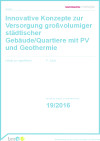
Schriftenreihe
19/2016
F. Zach
Herausgeber: BMVIT
Deutsch, 83 Seiten
Downloads zur Publikation
(Nudging-)Maßnahmen bei nachhaltigen Sanierungsprojekten
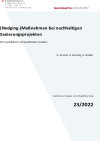
Auf der Grundlage einer soziologischen Kontextanalyse von ausgewählten Projekten der Programme „Haus der Zukunft“ und „Stadt der Zukunft“ und einer quantitativen Online-Erhebung unter NutzerInnen von Wohnobjekten werden unter verhaltensökonomischen Gesichtspunkten die relevantesten, durch Umbau- bzw. Sanierungsmaßnahmen verursachten Störfaktoren zusammengefasst und (Nudging-)Maßnahmen antizipiert.
Schriftenreihe
23/2022
K. Grosch, H. Kuschej, A. Walter
Herausgeber: BMK
Deutsch, 76 Seiten
Downloads zur Publikation
Innovationsachse Graz-Gleisdorf (G2G)
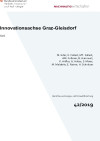
Entwicklung von Test- und Demonstrationsgebieten im Rahmen von ausgewählten Stadt(teil)entwicklungsvorhaben entlang der Innovationsachse Graz-Gleisdorf mit Fokus auf die Bereiche Energie, integrierte Gebäudetechnologien, smarter Stadtraum, kompakte Siedlungsstruktur, Nutzungsmix - Stadt der kurzen Wege, Generationenwohnen, intermodale Mobilität sowie Informations- und Kommunikationstechnologien (IKT).
Schriftenreihe
42/2019
M. Eder, K. Fallast, MT. Fallast, AM. Fulterer, B. Hammerl, K. Höfler, G. Huber, S. Maier, M. Malderle, E. Rainer, H. Schnitzer
Herausgeber: BMVIT
Deutsch, 115 Seiten
Downloads zur Publikation
Teilnahme am TASK 25 des Implementing Agreements on Solar Heating and Cooling der Internationalen Energieagentur (IEA)

Teilnahme am TASK 25 "Solarunterstützte Klimatisierung von Gebäuden". Beschreibung und Analyse des Standes der Technik, Simulation, Demonstrations-anlagen und Vermessung
PESI - Paradigmenwechsel im urbanen Energiesystem durch Synergiepotentiale mit der Industrie
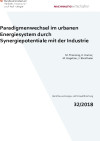
Analyse der Nutzungsmöglichkeiten industrieller Überschussenergien verschiedener Form (Abwärme, Abwasser, Abfall) sowie regenerativer Energieträger im industriellen Bereich (Solaranlagen auf Dachflächen) in angrenzenden urbanen Gebieten, die als Energieschwamm fungieren. Auf Basis realer Verbrauchs- und Verfügbarkeitsdaten wurde ein Simulationsmodell erstellt und Möglichkeiten zu Synergien dokumentiert.
Schriftenreihe
32/2018
M. Theissing, K. Karner, M. Rogetzer, J. Bärnthaler
Herausgeber: BMVIT
Deutsch, 69 Seiten
Downloads zur Publikation
TFlex - Temperaturflexibilisierung im Schwachlastbereich des Betriebs von Nahwärmenetzen
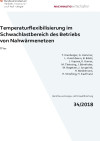
Im Zuge des Vorhabens TFlex wurde untersucht, ob sich die Netzverluste bestehender Nahwärmenetze in Schwachlastzeiten dadurch verringern lassen, indem in diesen Zeiträumen das Netz abschaltet und der Wärmebedarf der Kunden aus zuvor geladenen dezentralen Speichern bedient wird. Eine durchgängige wirtschaftliche Begleitung erlaubte es, bereits in der Projektlaufzeit technische Projekterfolge rasch in die Umsetzung zu bringen.
Schriftenreihe
34/2018
T. Kienberger, A. Hammer, L. Kriechbaum, B. Böckl, J. Vopava, K. Karner, M. Theissing, J. Bärnthaler, M. Rogetzer, J. Jungwirth, H. Biedermann, H. Strießnig, H. Kaufmann
Herausgeber: BMVIT
Deutsch, 48 Seiten
Downloads zur Publikation
Piezo-Klett: Entwicklung piezoelektrischer Klettanwendung zur Energieversorgung aktiver Sensorik im Bauwesen
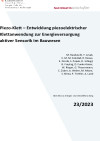
Das vorliegende Projekt betrachtet Gebäude, Gebäudeteile und ihre Anschlüsse (Bauteilknoten) als Energiegeneratoren, indem durch die Anwendung der Klettverbindung in Kombination mit dem piezoelektrischen Effekt ein so genanntes Energy Harvesting betrieben wird.
Schriftenreihe
23/2023
M. Raudaschl, T. Levak, V. M. M. Soledad, R. Riewe, E. Drnda, S. Popek, D. Schlegl, B. Freytag, D. Funke-Kaiser, W. Rieger, G. Theuermann, C. Zuber, A. Weber, M. Moser, S. Klima, P. Treitler, A. Lund
Herausgeber: BMK
Deutsch, 89 Seiten
Downloads zur Publikation
Urban Future - "Resource Efficient City of Tomorrow"
Challenges fort he cities of tomorrow with research issues referring to resource management, efficiency and technology development
SURO - Der städtische Untergrund als Rohstoffmine? Potential an Sekundärressourcen in der erdverlegten Infrastruktur
Machbarkeit eines Ressourcenkatasters zur Inventarisierung, Charakterisierung und Verortung der Materialbestände in den erdverlegten Infrastrukturnetzwerken österreichischer Stadtregionen. Das Ergebnis dient der ökonomischen Bewertung von Sekundärrohstoffpotenzialen.
Zertifizierung von Siedlungen / Quartieren
Sondierungsprojekt zur Übertragbarkeit des Schweizer Systems der 2000-Watt Arealbewertung auf Österreich
Thermisch-hygrisches Verhalten von Glasdoppelfassaden unter solarer Einwirkung - Theorieevaluierung durch Vorortmessung

Präzisierung der Ausgangsparameter von thermodynamischen Simulationsberechnungen durch Vorortmessungen an der fünfgeschoßigen Doppelfassade des Bundessozialpädagogischen Instituts Baden bei Wien
OPEN HEAT GRID - Offene Wärmenetze in urbanen Hybridsystemen
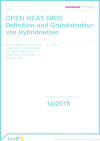
Primäres Forschungsthema von OPEN HEAT GRID war die Untersuchung der Möglichkeiten zur Forcierung der Einspeisung industrieller Abwärme in bestehende Fernwärmenetze.
Schriftenreihe
1/2018
Herausgeber: BMVIT
Deutsch
Downloads zur Publikation
Recommendations for a consolidated Austrian research in the topic of "Smart Cities"
Based on a clear definition of the topics and focusing on energy relevant aspects the project will provide an overview on the present points of focus in research on "Smart Cities". Furthermore, future research topics will be defined and evaluated, and action plans for political stakeholders will be elaborated in the framework of two expert workshops.
REVITALISIERUNG mit S.A.M. - Synergie aktivierende Module

Fallspezifisch entwickelte Synergie aktivierende Module zur Revitalisierung bestehender Baustrukturen ohne Nutzungsunterbrechung (zwei Projekte, eine Ausführung).
ProKlim - Prognosegesteuerte Gebäudeklimatisierung
Energieeffizienzsteigerung in der automatisierten Gebäudeklimatisierung durch wetterprognoseunterstützte Regelung
Low Tech – High Effect! Eine Übersicht über nachhaltige Low Tech Gebäude
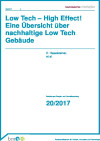
In dieser Studie wurden Ansätze von Low Tech Gebäuden näher betrachtet und besonders innovativ und repräsentativ erscheinende Konzepte detailliert dokumentiert. Ziel war es, den derzeitigen Stand der Technik und das vorhandene Know-how und Wissen anhand realisierter Beispiele aufzuarbeiten sowie Potenziale zur Weiterentwicklung aufzuzeigen.
Schriftenreihe
20/2017
Edeltraud Haselsteiner, Andrea Bodvay, Susanne Gosztonyi, Anita Preisler, Michael Berger, Bernhard Gasser
Herausgeber: BMVIT
Deutsch, 192 Seiten
Downloads zur Publikation
Optimierung der SOLARenergienutzung in URbanen Energiesystemen (URSOLAR)
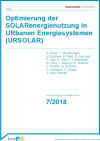
URSOLAR stellt EntscheidungsträgerInnen eine Roadmap zur integrierten urbanen Solarenergie-nutzung zur Verfügung. Es wird aufgezeigt, wie Photovoltaik (PV) und Solarthermie angepasst an infrastrukturelle und rechtliche Gegebenheiten in idealtypischen Stadtquartieren aus ökonomischer, ökologischer und sozialer Sicht sowie unter Berücksichtig von Stakeholder-Interessen optimal ge-nutzt werden können.
Schriftenreihe
7/2018
A. Posch, T. Brudermann, M. Buchner, E. Fleiß, D. Geringer, P. Hart, S. Hatzl, T. Kallsperger, G. Lang, T. Mayrold, E. Meißner, C. Reischl, G. Schnedl, S. Seebauer, K. Stöger, A. Würz-Stalder
Herausgeber: BMVIT
Deutsch, 137 Seiten
Downloads zur Publikation
MARGRET - Measurement of greened/non-greened objects for the adaptation of calculation models
Development of measurement methods to determine the influence of greening measures on greened versus non-greened reference objects with contemporary building standards under uniform framework conditions. Proposals for adaptations of calculation models or standards to e.g. enable an integration in the energy performance certificate.
Urbaner Kältebedarf in Österreich 2030/2050
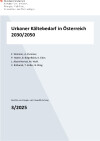
Systematische Aufarbeitung des steigenden Kühlbedarfs und Darstellung der geographischen Verortung des Kältebedarfs in Österreich. Das Ergebnis dient als Entscheidungshilfe bei der Entwicklung von Klimaschutzmaßnahmen und Klimawandelanpassungsstrategien sowie eine Abschätzung zum Kältebedarf der Zukunft.
Schriftenreihe
3/2025
F. Wimmer, A. Pummer, P. Holzer, B. Beigelböck, K. Eder, L. Abart-Heriszt, M. Wolf, C. Rzihacek, T. Keller, B. Kling
Herausgeber: BMK
Deutsch, 91 Seiten
